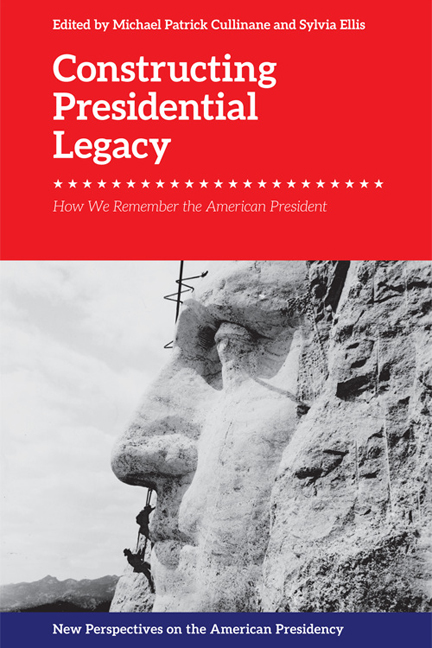Book contents
- Frontmatter
- Contents
- Acknowledgments
- Notes on Contributors
- An introduction to Presidential Legacy
- 1 Presidential Temples: America’s Presidential Libraries and Centers from the 1930s to Today
- 2 Presidential Legacy: A Literary Problem
- 3 Pennsylvania Avenue meets Madison Avenue: The White House and Commercial Advertising
- 4 Eisenhower’s Farewell Address in History and Memory
- 5 Pageantry, Performance, and Statecraft: Diplomacy and the Presidential Image
- 6 “You’ve got to decide how you want history to remember you”: The legacy of Lyndon B. Johnson in film and Television
- 7 The Farewell Tour: Presidential Travel and Legacy Building
- 8 Reflecting or Reshaping?: Landmark Anniversaries and Presidential Legacy
- 9 From a “New Paradigm” to “Memorial Sprawl”: The Dwight D. Eisenhower Presidential Memorial
- 10 Top Trumps: Presidential Legacies, New Technologies, and a New Generation
- Epilogue: Confessions of a Presidential Biographer
- Index
4 - Eisenhower’s Farewell Address in History and Memory
Published online by Cambridge University Press: 01 May 2021
- Frontmatter
- Contents
- Acknowledgments
- Notes on Contributors
- An introduction to Presidential Legacy
- 1 Presidential Temples: America’s Presidential Libraries and Centers from the 1930s to Today
- 2 Presidential Legacy: A Literary Problem
- 3 Pennsylvania Avenue meets Madison Avenue: The White House and Commercial Advertising
- 4 Eisenhower’s Farewell Address in History and Memory
- 5 Pageantry, Performance, and Statecraft: Diplomacy and the Presidential Image
- 6 “You’ve got to decide how you want history to remember you”: The legacy of Lyndon B. Johnson in film and Television
- 7 The Farewell Tour: Presidential Travel and Legacy Building
- 8 Reflecting or Reshaping?: Landmark Anniversaries and Presidential Legacy
- 9 From a “New Paradigm” to “Memorial Sprawl”: The Dwight D. Eisenhower Presidential Memorial
- 10 Top Trumps: Presidential Legacies, New Technologies, and a New Generation
- Epilogue: Confessions of a Presidential Biographer
- Index
Summary
Speaking before a national radio and television audience on the evening of January 17, 1961, President Dwight D. Eisenhower solemnly intoned:
In the councils of government, we must guard against the acquisition of unwarranted influence, whether sought or unsought, by the militaryindustrial complex. The potential for the disastrous rise of misplaced power exists and will persist … Only an alert and knowledgeable citizenry can compel the proper meshing of the huge industrial and military machinery of defense with our peaceful methods and goals, so that security and liberty may prosper together.
This one passage has resonated over the years, so much so that the phrase “military-industrial complex” has become almost synonymous with the entire Farewell Address, of which it was but one component. While Eisenhower scholars have mulled over the genesis and evolution of the speech and the president's intent for decades, relatively few historical analyses of the speech itself have been undertaken. This chapter will delineate the political and policy context from which Eisenhower developed the speech, primarily his long-running efforts to achieve “security with solvency” by pursuing a capital-intensive strategy of containment, with profound implications for American science, technology, and political institutions. To some extent, Eisenhower's speech contained a powerful note of irony, if not regret, because for much of his professional life he had done more to foster the growth of the military-industrial complex and grapple with its consequences than any other American leader. The chapter will also delve into the drafting process, which began almost two years before Eisenhower left office, and offer suggestions as to the president's intent and the origins of some of the concepts and phraseology that constituted the speech. Eisenhower and his speechwriting team deliberately modeled the address on that of George Washington and, like the Founding Father, couched a political message in rhetoric that conveyed an air of wise, apolitical statesmanship. Finally, the chapter will discuss the subsequent reception of the speech, both by contemporaries and in popular memory. It will argue that the subtlety of the language deployed by Eisenhower's team contributed to such ambiguity about the president's precise meaning that the phrase “military-industrial complex” would be taken up predominantly by activists on the left of the political spectrum who co-opted Eisenhower's rhetorical legacy for their own purposes and for ends that Eisenhower would probably never have approved.
- Type
- Chapter
- Information
- Constructing Presidential LegacyHow we Remember the American President, pp. 76 - 102Publisher: Edinburgh University PressPrint publication year: 2018



